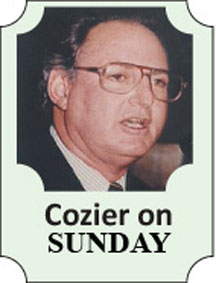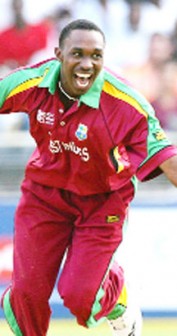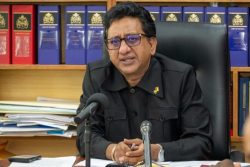ACCORDING to Clyde Butts, he and his selection panel went for Dwayne Bravo to take over from Darren Sammy as captain for next month’s Champions Trophy and the later ODIs against India, Sri Lanka and Pakistan at home because “we believe it is best that we freshen the leadership of the team in this format.”
The basis given for the change was the negative overseas record in such series – successive losses to India 4-1, England 2-0, Bangladesh 3-2 and Australia 5-0 – as against the triumph in last October’s World Twenty20 and six straight victories in Tests (granted over New Zealand, Bangladesh and Zimbabwe but victories, and conclusive, all the same).
The straightforward reasons for such reversals were either batting breakdowns or the inability of the bowling to finish off strong positions in the field. They were not confined to the limited-overs contests; a combination of the two allowed India and Australia to wriggle out of tight spots at least twice in their most recent Test series to clinch wins.
 Whether or not Sammy could reasonably be held responsible for the ODI stats, he was captain and the buck stopped with him. Whether or not Bravo can “freshen the leadership” (his relationship with coach Ottis Gibson is an important aspect in the transition), he will be similarly judged on his team’s performance, in the Champions Trophy and beyond.
Whether or not Sammy could reasonably be held responsible for the ODI stats, he was captain and the buck stopped with him. Whether or not Bravo can “freshen the leadership” (his relationship with coach Ottis Gibson is an important aspect in the transition), he will be similarly judged on his team’s performance, in the Champions Trophy and beyond.
A few ODI examples of West Indies’ losses away from home in the past year illustrate the inconsistencies.
In England last June, totals of 172 (all out with 16.2 overs still available) and 238 for nine were utterly inadequate against opponents whose superiority had been proven in the preceding Tests.
In Bangladesh in November, all-out batting crashes to 199, 132 and 217 (after raising declared totals of 527 for four and 648 for nine in the two Tests) opened the way for the subsequent, embarrassing 3-2 loss in the 50-overs-an-innings version.
In Perth in February, the crash to 70 all out off 23.5 overs against Australia’s swing in the opening match was an immediate setback. When, in the next at the same venue, Australia slid to 98 for six in the 24th over against purposeful early bowling and slick catching, it was a spirited turnaround.
Very quickly, their intensity and confidence faded while Australia’s took the opposite direction; the total rose to 266 for seven. It proved a mountain too high to climb.
The pattern was repeated in the final match when Australia were revived from 82 for four at the half-way point of the innings to 274 for five at the end; Adam Voges, a 33-year-old little known outside of Australia, swung things around with an unbeaten 112.
There were a couple of mitigating circumstances to Sammy’s ODI record that shouldn’t confront Bravo.
In Bangladesh, West Indies were without Bravo himself and Tino Best, both injured; in Australia, Marlon Samuels was eliminated by a Malinga-inflicted eye injury. All three are back for the Champions Trophy.

Perhaps even more significant was the rare failure of Chris Gayle in both series (82 runs in eight innings). The power-packing left-hander has now got his groove back, albeit in the Twenty20 slug-fest of the IPL. He is unlikely to be so ineffective in England; if he is, there are problems for the West Indies, and Bravo.
Although not openly mentioned, the selectors might have had other grounds for the captaincy swap.
It relieves Sammy of the demands of leading in all three formats (as he had done in 25 Tests, 51 ODIs and 21 Twenty20s in his two and a half years in charge).
More to the point, it allows for the inclusion in the starting 11 of, to use the contemporary description, an additional ‘impact’ bowler, one of genuine pace or quality spin, rather than the medium-pace double of Sammy and Bravo.
Sammy’s choice to take over from Gayle in October 2010 did not meet with universal public approval. It is an opinion that has gradually changed. Now, even in a limited capacity, Bravo must prove his worth as well.
++++++++++++++++++++++++++++++++++
IT WAS simply a matter of time.
As individual cricket boards rushed to organize their own peculiar franchise Twenty20 tournaments over the past few years, clashes with scheduling were inevitable. Each goes for between five weeks and eight; there are not just enough weeks in the year to contain them all – and the International Cricket Council (ICC) programme of Tests and ODIs as well.
The Indian Premier League (IPL) got in early and, with its astonishing dollar contracts attracting the best overseas players, influenced the ICC to set aside a window to accommodate it in which there would be no international series.
The ICC later went further by creating another such period for the bi-annual Champions League featuring the top teams in the various franchise leagues.
India, Australia and South Africa were the originators and investors and were given such priority that their numbers dominate the entries. The lesser lights – West Indies, New Zealand, Sri Lanka and the like – have only ever had one.
England were the originators of professional Twenty20 between their 18 counties. The Stanford Twenty20 soon followed at the since imprisoned Texan’s own ground in Antigua. Both were limited to home players.
The IPL expanded the net. Top players flooded in to claim huge pay days.
It was followed by Australia’s Big Bash, the Bangladesh Premier League (BPL) and the Sri Lanka Premier League (SLPL). South Africa’s has been going since 2010-11 and is now known as, wait for it, the Ram Slam T20 Challenge.
TheWICB sold the rights to its Twenty20 last year to Verus International, a successful wealth management company with headquarters in New York and Barbados. Its venture, featuring six franchise teams led by six so-called contemporary West Indies legends and each including an overseas player, runs from July 29 to August 26.
And that is where the first conflict has arisen.
Sri Lanka Cricket last week asked the WICB to reschedule the inaugural CPL since its Twenty20 is down to start August 10. Ajit Jayasekara, a Sri Lankan Cricket director, has pointed out it can’t adjust its Twenty20 since the Champions League, in which the Sri Lanka winners are entered, starts in mid-September.
The case is complicated by Sri Lanka’s great, retired off-spinner Muttiah Muralitheran who played for Uthura Rudra in the Sri Lanka league last year and signed a contract last month with the CPL.
“There is quite a big overlap there, and because we announced our tournament last year and have set that window aside, we have asked the Caribbean Premier League tournament to move their tournament up,” Jayasekara reasoned. “Those discussions haven’t started yet, but we are hopeful we can work something out.”
As the CPL issued its match schedule on Friday, it doesn’t seem as if they can work something out – unless the ICC steps in and makes a deliberate effort to sort out the entire scheduling mess created by the expansion of Twenty20 leagues.
That, as we know, just won’t happen so long as India are satisfied with their arrangement.









